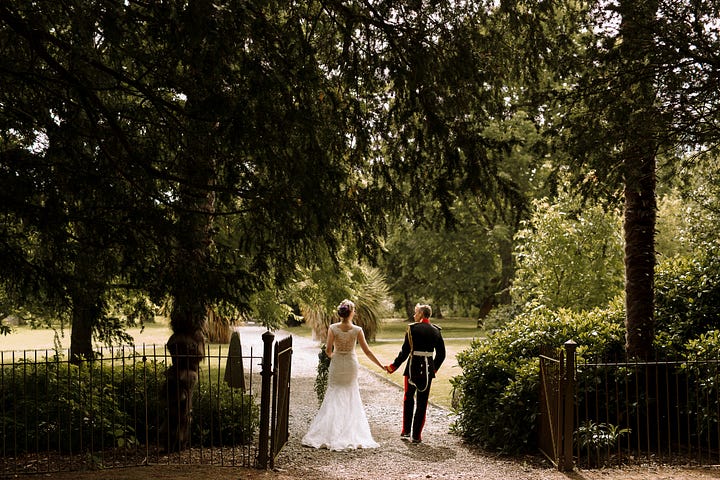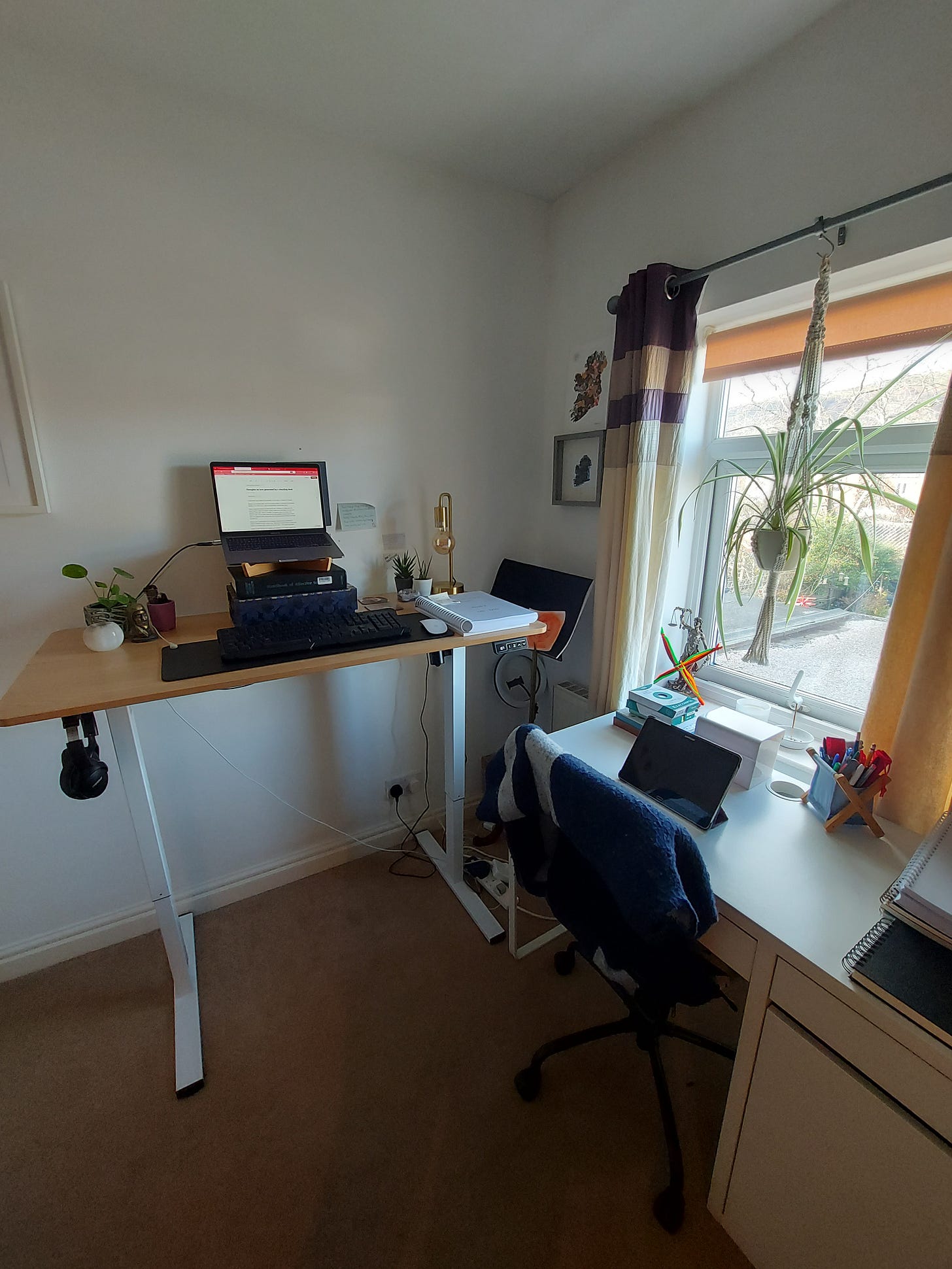I would never have written this newsletter, on this topic, if it wasn’t for Stanley.
Stanley is my standing desk and is the newest addition to the team (of inanimate objects) in my office (a.k.a. spare room/dressing room/storage room).
I wasn’t expecting Stanley to come into my life. I had been in a long-term (8+ years) slightly fraught but mostly content, relationship with Micke, my teeny tiny children’s IKEA desk. Micke is unstable, he wobbles quite a bit (that’s what happens when you are taken apart and put back together by four house moves) and is not generous with surface area, but I’ve long accepted his flaws and made the best of it.
Stanley was a surprise gift from my husband, who was not so accepting of Micke’s wobbles and poor surface area. Watching me have to balance papers and books on my knees while I wrote was the last straw — “You need a new desk”.
Stanley arrived. We built him together and delighted in the simple novelty of the gently whirring electric motor that raises his desk-top up and down.
I write this now, standing at Stanley and think of what this desk represents: generosity, support and love. For this is what lies behind so many of the things and ways —of which Stanley is just the most recent— my husband has supported (enabled, even) the work the Women of Ireland Project asks of me. Probably the most precious has been how he has bought me time. When I quit my job to do this, he got a new one — one that plugged the gap in the household income the loss of my salary brought.
For click-bait, I could title this piece:
Women of Ireland Project funded by a former British soldier
And it wouldn’t be far off the truth.
Because when I met my husband and found my soulmate, he was a serving soldier in the British army. Teenage me (the patriotically Irish little thing) would have been shocked and horrified. She absolutely would not have thought that falling in love with a British soldier would be her future and would have been resolutely against it — and I’m sure there are plenty in Ireland who would have a similar reaction now.
I don’t really know how to describe what love is —it is a many and complex thing— but I think you can know you are working with and from a place of love when you are seeing beyond the things that, without it, would get in the way.
I saw beyond the British Army Uniform. Love x-ray visioned past that, and cut straight through to the kind, loving, generous man.
That’s my best definition of love.


Funnily enough, love — or at least outright discussions of it— don’t feature much in the stories of the women I’ve interviewed for this project. I don’t know what that says about us?
But acts of love are certainly there.
And it’s not the flowers and chocolates of Valentine’s Day that feature in someone’s life rememberings as moments of love. It’s the times when people showed up for one another, when decisions which honoured the individual human need were made and supported (rather than the one that kept everyone else comfortable), in the moments when mutual respect was genuinely cultivated, and the times when human-to-human connection was allowed to cut through the superficial outer crust (the labels, the masks, the titles, the norms) that usually keep people circling near to, but never getting into, relationship.
I learn something from every interview I do, but the power of compassion and love to get us from a place of restriction and disconnection to a place of expansion and connection, was taught to me this week by the interview I’ve been analysing, standing at Stanley. And has, no doubt, shaped much of the musings I've attempted to express here.
Growing up Irish-American, still with a connection to wider family in Ireland, this woman I speak of always felt a strong cultural connection to Ireland. It was all the more difficult then, that when she moved to Ireland, nearly a decade ago, her Irish-American identity and her cultural connections to Ireland were repeatedly dismissed by Irish people. When she tried to connect, converse or engage with other Irish people, things she had thought of as mutual ground were swiftly knocked down with social punishment — slagging, belittling and shaming. Her ‘Irishness’ was not acceptable, threatening even, and her ‘American-ness’ was too much; it needed to be toned down.
For a long time, in a desire to be accepted, she silenced parts of herself, creating a perfectly curated persona she thought would be acceptable to Irish people and allow her to get beyond the invisible barriers (something she said, the way she said it) that seemed to impede meaningful interactions (something a bit more than chatting about the weather). And it still didn’t work — she was left isolated and lonely on the island she had longed to live on her whole life, exhausted by trying to be someone she wasn’t.
Yet, how she chose to deal with this repeated dismissal of her Self and the expectation that she conform to strict notions of Irishness is compelling.
She chose not to meet the social punishment she experienced with anger or indignation, but with love and compassion.
Each time her personality and identity were slagged, belittled, shamed or dismissed, she chose to read it as wounding and unprocessed grief, still stuck in people’s bodies, over the historical emptying of the country and manifesting in a ‘protectiveness’ of Irishness. Every time her personality and identity were dismissed, her ways of communicating punished, or her attempts at connection shut down, she brought compassion.
Love, not confrontation or argument, was the resource she chose to deal with how Irish people othered her, and it helped her get to what was actually important: developing meaningful connections with people and being in relationship and community with others.
“I have so much love for every Irish person…. I didn't always, and that, that was self-limiting. But I do now and it's very genuine”
Ireland, as I am discovering through continued analysis of the women of Ireland project interviews, is quite a segregated country; full of ‘Us’ and ‘Them’ and otherings, a place were people can be quick to judge and were social conformity —doing what makes other people feel comfortable— is praised and rewarded; the definition of ‘being good’. If anything, segregations, and social expectations are a bigger feature of women’s stories than acts of love. What does that say?
I don’t have any answers, but I imagine there would be a lot less judgement and shaming if we moved from always operating out of fear and threat, to operating out of love.
Love is what helps us see and move beyond (the things that get in the way, keeping us separate and disconnected).
And while I still don’t really know how to capture what love is, one thing I do know is that I wouldn’t have this lovely standing desk to work at if I hadn’t let love guide me the day I met my British soldier.
xx




